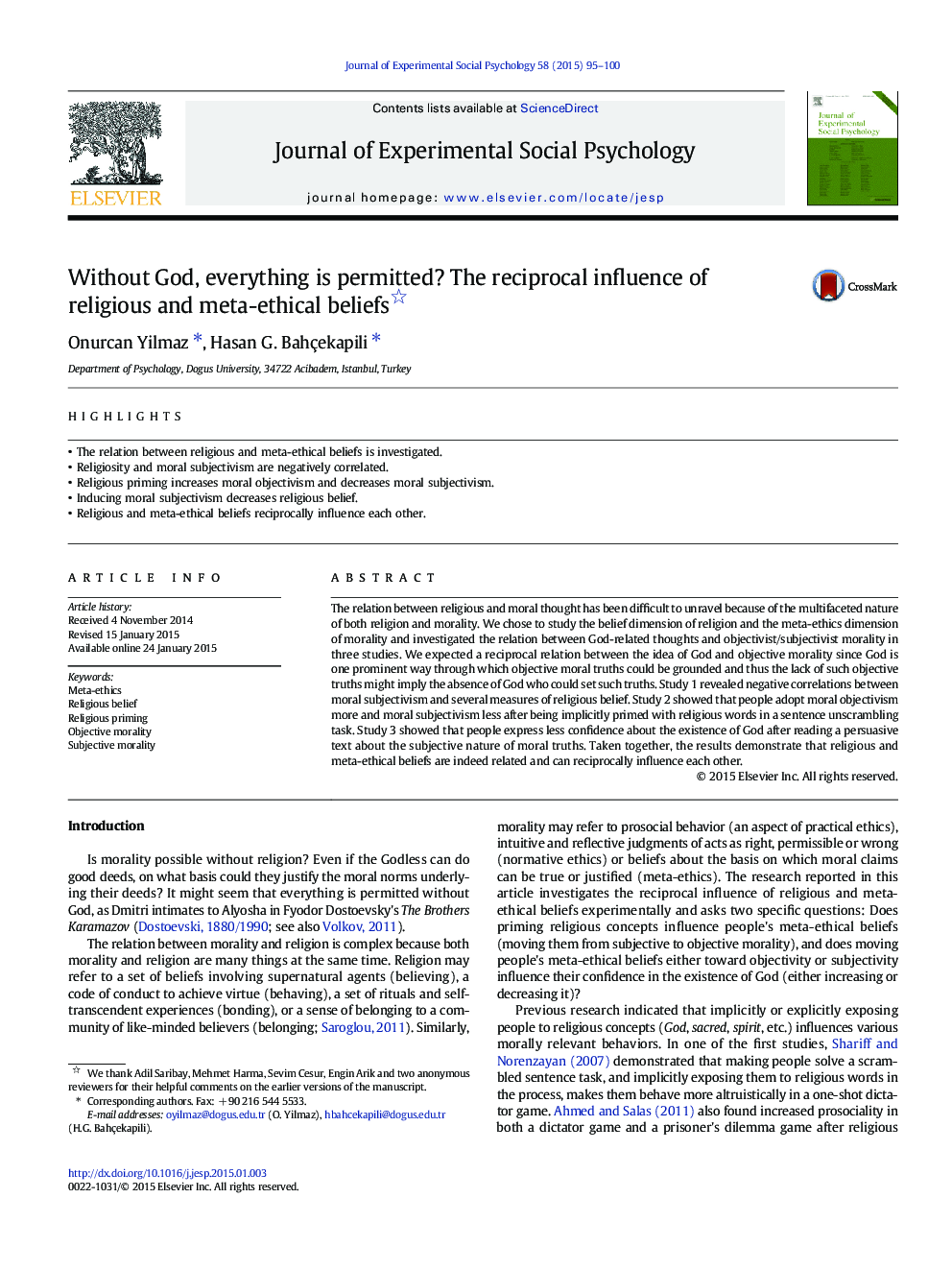| کد مقاله | کد نشریه | سال انتشار | مقاله انگلیسی | نسخه تمام متن |
|---|---|---|---|---|
| 7324681 | 1475865 | 2015 | 6 صفحه PDF | دانلود رایگان |
عنوان انگلیسی مقاله ISI
Without God, everything is permitted? The reciprocal influence of religious and meta-ethical beliefs
ترجمه فارسی عنوان
بدون خدا، همه چیز مجاز است؟ نفوذ متقابل اعتقادات مذهبی و اخلاقی
دانلود مقاله + سفارش ترجمه
دانلود مقاله ISI انگلیسی
رایگان برای ایرانیان
کلمات کلیدی
متا اخلاق، اعتقاد مذهبی، آغازگر مذهبی، اخلاق هدف، اخلاق ذهنی،
ترجمه چکیده
رابطه بین تفکر دینی و اخلاق به دلیل طبیعت چند وجهی دین و اخلاق دشوار است. ما تصمیم گرفتیم بعد معنوی دین و ابعاد اخلاقی اخلاقی را مطالعه کنیم و رابطه بین اندیشه های مرتبط با خدا و اخلاق عینی / سوبژکتیویسم را در سه مطالعه بررسی کردیم. ما انتظار یک رابطه متقابل بین ایده خدا و اخلاق هدف داشتیم؛ زیرا خدا یکی از راه های برجسته ای است که از طریق آن حقایق اخلاقی می تواند پایه گذاری شود و بنابراین فقدان چنین حقایق حقوقی ممکن است به عدم وجود خدا باشد که می تواند چنین حقایق را تعیین کند. مطالعه 1 همبستگی منفی بین ذهنی گرایی اخلاقی و چندین معیار اعتقاد دینی را نشان داد. مطالعه 2 نشان داد افرادی که عقل گرائی اخلاقی را بیشتر و ذهنیت گرایی اخلاقی کمتر می پذیرند پس از آن که به طور ضمنی با کلمات مذهبی در یک کار غیر شفاف بیان می شوند. مطالعه 3 نشان داد که مردم پس از خواندن متن متقاعد کننده ای درباره ماهیت ذهنی حقایق اخلاقی، اعتماد کمتر نسبت به وجود خدا دارند. نتایج حاصل نشان می دهد که اعتقادات مذهبی و اخلاقی در واقع در ارتباط هستند و می توانند به یکدیگر متکی باشند.
موضوعات مرتبط
علوم زیستی و بیوفناوری
علم عصب شناسی
علوم اعصاب رفتاری
چکیده انگلیسی
The relation between religious and moral thought has been difficult to unravel because of the multifaceted nature of both religion and morality. We chose to study the belief dimension of religion and the meta-ethics dimension of morality and investigated the relation between God-related thoughts and objectivist/subjectivist morality in three studies. We expected a reciprocal relation between the idea of God and objective morality since God is one prominent way through which objective moral truths could be grounded and thus the lack of such objective truths might imply the absence of God who could set such truths. Study 1 revealed negative correlations between moral subjectivism and several measures of religious belief. Study 2 showed that people adopt moral objectivism more and moral subjectivism less after being implicitly primed with religious words in a sentence unscrambling task. Study 3 showed that people express less confidence about the existence of God after reading a persuasive text about the subjective nature of moral truths. Taken together, the results demonstrate that religious and meta-ethical beliefs are indeed related and can reciprocally influence each other.
ناشر
Database: Elsevier - ScienceDirect (ساینس دایرکت)
Journal: Journal of Experimental Social Psychology - Volume 58, May 2015, Pages 95-100
Journal: Journal of Experimental Social Psychology - Volume 58, May 2015, Pages 95-100
نویسندگان
Onurcan Yilmaz, Hasan G. Bahçekapili,
